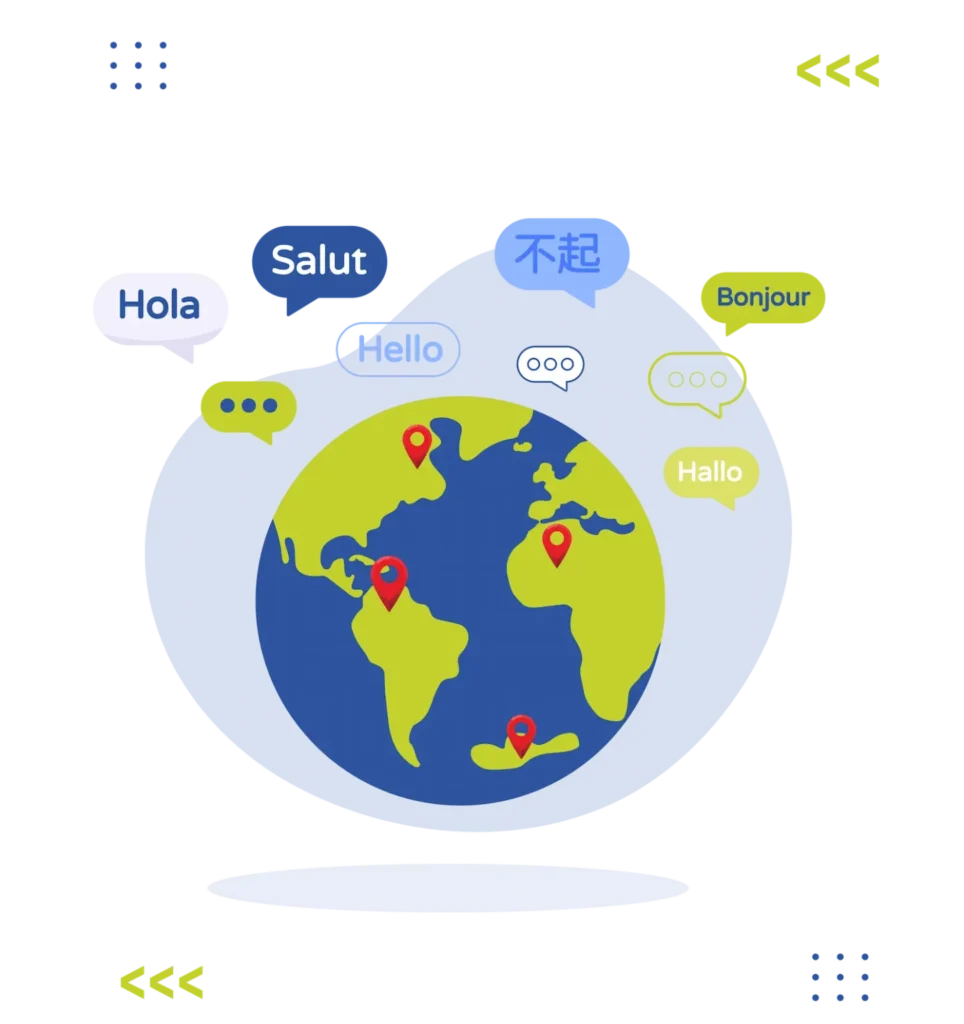A question that usually haunts a lot of people in the field of languages is “what is the Importance of Arabic Language Localization?”
Arabic language localization goes beyond translation, tailoring content to fit local cultural values, preferences, and regional nuances. This process builds trust and engagement by ensuring that messaging resonates with Arabic-speaking audiences, enhancing digital visibility and user experience. By adapting everything from text and visuals to legal content, businesses can boost their presence in the MENA region, foster customer loyalty, and navigate the complexities of local markets effectively, all while ensuring SEO success and compliance with regional standards.
What is Language localization?
As mentioned above, localization is the act of translating a text by putting into use the culture of the target audience rather than simply relying on the translation of words. By simply looking at the term localization, we can infer that it means to produce a localized product made specifically for the target local culture.
With that being said, you might wonder:
Why is Language localization important?
Other than the pivotal role it plays in delivering the messages and in the understanding process of the target audience, localization plays a very important role in increasing the credibility and accuracy of the translation. When taking in consideration the culture of the target audience, you are building a bond between you and the target audience. This bond is established on firm grounds of inclusivity and appreciation. It helps remove all barriers and sense of detachment between the audience and the text.
If you take a look around you, you will find the majority of international websites localizing their websites, to be able to reach more people. It is safe to say that localization will help your brand grow and expand across the globe by improving the customer experience.
Importance of Arabic Language Localization
Arabic language localization plays a crucial role in bridging the cultural and linguistic gaps between the Arabic-speaking world and global markets. As the primary language of over 400 million people across 22 countries, Arabic is not only a means of communication but also a vessel of culture, identity, and tradition. Localization goes beyond simple translation—it adapts content to resonate with the local audience, ensuring it is contextually relevant, culturally appropriate, and technically accurate.
1. Cultural Relevance and Sensitivity
Localization of Arabic content ensures that messaging aligns with cultural values, social norms, and regional sensitivities. This is particularly important in a region where customs, beliefs, and traditions vary significantly between countries. For example, images, humor, and references in advertising or digital content must be carefully tailored to avoid misinterpretation or offense. This helps build trust with the audience, showing respect for their culture and ensuring that the brand message is received in the intended way.
2. Market Expansion and Customer Engagement
In the competitive global market, companies that localize their products, websites, and marketing materials into Arabic have a significant advantage. By adapting content to suit the specific language and preferences of Arabic-speaking consumers, companies can increase customer engagement, enhance user experience, and foster stronger connections. As many Arabic speakers prefer content in their native language, providing localized Arabic experiences can significantly boost brand loyalty and sales, particularly in the Middle East and North Africa (MENA) region.
3. Improved Communication and Accessibility
Localization of Arabic ensures that information is communicated clearly and effectively to the target audience. Whether it’s an educational platform, healthcare information, or a financial service, localized Arabic content is essential for ensuring that critical information is accessible and understandable. This is especially important in regions where literacy levels may vary or where specialized terminology needs to be explained in simple, everyday language.
4. SEO and Digital Marketing
When it comes to online presence, Arabic language localization plays a vital role in search engine optimization (SEO). Arabic-speaking users tend to search for products, services, and information in their native language, so localizing a website or digital content for Arabic can help improve visibility on local search engines. Proper localization ensures that content is indexed appropriately, targeting the right keywords in the local dialects and increasing online traffic.
5. Legal and Regulatory Compliance
In many Arabic-speaking countries, laws and regulations often require businesses to present information in Arabic for legal reasons. This includes contracts, terms of service, product labeling, and advertising. Localization is crucial for ensuring that businesses comply with local laws and provide clear and accurate information to avoid legal issues.
Arabization vs. Localization: What’s the Difference?
While both Arabization and localization are processes aimed at adapting content for Arab-speaking audiences, they differ in their scope, focus, and the extent to which they modify the original content. Here’s a breakdown of each term and the key differences between them:
Arabization
Arabization refers to the process of adapting products, services, or content to fit the linguistic, cultural, and societal needs of the Arab world. It primarily focuses on language conversion, ensuring that content is translated into Arabic while maintaining the intended meaning. However, Arabization also goes beyond mere translation by aligning the content with Arab norms, values, and traditions.
In addition to language translation, Arabization might involve the modification of certain cultural references, symbols, or images that might be inappropriate or unfamiliar to Arab audiences. For example, Western advertising content may need to change to resonate better with Arab values, such as adjusting images that might not align with the modesty standards prevalent in many Arab countries.
Key characteristics of Arabization:
- Focuses primarily on language translation into Arabic.
- Adjusts content to reflect cultural sensitivity for Arab audiences.
- Can include modifying graphics, colors, and references to better suit Arab culture.
Localization
Localization, on the other hand, is a more comprehensive and in-depth process. It goes beyond translation and Arabization to ensure that a product, service, or content feels “native” to the target Arab audience. Localization involves adapting not only the language but also the format, measurements, currencies, legal standards, and even the style of communication to fit the local context.
Localization addresses regional variations within the Arab world itself—recognizing that the needs of audiences in Egypt, Saudi Arabia, or the UAE may differ significantly. For example, the tone of language and the way products are marketed may vary depending on the local preferences, cultural taboos, and purchasing behavior in different countries.
Key characteristics of Localization:
- Goes beyond translation to adapt content, visuals, and even design elements.
- Ensures compatibility with regional preferences and behaviors within the Arab world.
- Considers local laws, currencies, and regional dialects (e.g., Egyptian Arabic vs. Gulf Arabic).
What languages are most popular for localization?
Localization is a linguistic process that does not rely solely on one language, it can help you reach more people from everywhere around the world.
There are, however, a number of languages that are the most prominent in the field of localization. The most prominent languages in localization are: German, French, Spanish, Italian, and Dutch.
1. German
Spoken by over 130 million people around the world, German is one of the most popular languages in the field of localization. This comes as a result of it being the mother tongue of countries like Germany, Switzerland, and Austria, resembling a huge business market in Europe.
2. French
French comes in second, being the language of diplomacy and international relations. With over 250 million francophones around the world, a huge number of businesses tend to gravitate towards the French language in localization.
3. Spanish
Coming in third is Spanish, with over 500 million native speakers globally. It is the language with the most diversified cultures running across Latin America and Europe.
4. Italian
Italy is the center point for art and fashion; thus, Italian comes fourth with over 60 million speakers across the globe. It is a dynamic market for a huge number of businesses.
5. Dutch
Last, but certainly not least on our list is Dutch. Despite the fact that it is not a globally popular language and is spoken by only 28 million people, the Netherlands is, however, a very attractive destination for the tech-savvy population.
What are some examples of Arabic localization?
Localization can come in different forms, either visual or audible.
1. Arabic Website Localization
One example of localization can be the Arabic localization of websites. This can be seen through the websites of worldwide brands, whether fashion brands, technology brands, or even official websites of leading organizations. The viewer would usually be able to choose between two or more languages to browse from.
2. Arabic Audio and Video Localization
Another example of localization is Arabic audio and video localization. This can be done by providing various subtitled options, as well as various dubbed versions for the viewer to choose from.
3. Arabic Game Localization
Arabic Game localization can help you connect with worldwide gamers, since it aims to establish your game as a culturally and linguistically relevant game.
What is the difference between translation and localization?
Localization is a type of translation; however, it is an advanced version of the translation that helps include the target audience’s identity in the text.
Translation is the mere act of converting a set of words from one language to another. It can be applied to written as well as spoken language, in the form of interpretation.
Localization, on the other hand, is a deeper process where the translator dives deep into the culture and history of a region or a country. It involves cultural adaptation to produce a text that is relatable to the target audience.
Localization, unlike translation, can be applied to a number of texts, such as websites, audios, and videos as mentioned above. It can also be applied to software, applications, multimedia, and so much more.
Hence, localization is not just an inclusive process for different cultures and people, but also for different forms of media and content.
To sum up, localization is the process of translating a given text in a way that fits the culture of the target audience. By working on localization, we ensure that translated texts are not merely translated word for word.
Challenges in Arabic Localization
Arabic localization presents a unique set of challenges that businesses must address to ensure their products and services resonate with Arabic-speaking audiences. As one of the most widely spoken languages in the world, Arabic’s rich linguistic, cultural, and regional diversity requires careful consideration during the localization process.
1. Linguistic and Script Differences
The Arabic language is written from right to left, which poses significant challenges for the layout and design of websites, apps, and documents. This mirrored orientation affects the placement of text, icons, and navigation menus. Additionally, the Arabic script has contextual letter forms that change depending on their position in a word, making translation and display more complex. Ensuring that the content is not only linguistically accurate but also visually aligned with the reading habits of Arabic users is key to successful localization.
2. Cultural Sensitivity and Context
Beyond translation, Arabic localization requires an understanding of cultural nuances. The Arab world is diverse, with different customs, traditions, and even religious considerations across regions. Words or images that are acceptable in one Arab country might be offensive in another. For example, certain colors, symbols, or phrases may carry different meanings, so it’s essential to adapt content to reflect local sensibilities. Localization needs to consider taboos, respect for religious practices, and regional dialects.
3. Regional Dialects
Arabic is not a single, unified language; it consists of many dialects that vary significantly from one region to another. While Modern Standard Arabic (MSA) is understood across the Arab world, it is primarily used in formal contexts like news, literature, and official documents. In daily life, people use various dialects, such as Egyptian, Levantine, Gulf, and Maghrebi. For effective localization, understanding the target audience’s dialect is crucial, particularly for marketing campaigns or content aimed at building a personal connection with users.
4. Technical and Platform Limitations
When localizing digital products, such as websites, mobile apps, or software, developers face challenges related to technical compatibility. Arabic text may not display correctly on certain platforms if the proper fonts and language settings are not supported. Additionally, bidirectional text handling, where content alternates between right-to-left and left-to-right, can complicate the design and functionality of user interfaces. These issues require experienced developers and designers who understand the intricacies of Arabic text processing.
5. Legal and Regulatory Compliance
Countries in the Arab world have distinct laws and regulations that affect content localization, particularly in sectors like e-commerce, media, and advertising. For instance, some countries have strict guidelines regarding the use of religious imagery, censorship of certain content, and the protection of personal data. It’s important to ensure that localized content complies with these regulations to avoid legal issues or damage to a brand’s reputation.
6. Translation Quality and Consistency
Accurate translation is vital for Arabic localization, but it’s not always straightforward. Automated translation tools might not capture the subtleties of the language, leading to misinterpretations or awkward phrasing. A professional team of translators who are native speakers and familiar with the target audience’s cultural context is essential. Maintaining consistency across all localized materials, whether in marketing, legal documents, or user interfaces, is also crucial to maintaining brand integrity.
How to Choose a Reliable Arabic Localization Provider?
Choosing a reliable Arabic localization provider is a crucial step for any business aiming to reach Arabic-speaking audiences effectively. Localization goes beyond simple translation; it involves adapting content to meet the cultural, linguistic, and functional expectations of the target market. Here are some key factors to consider when selecting a reliable Arabic localization provider:
1. Expertise in the Arabic Language and Culture
The first and foremost factor is the provider’s understanding of both the Arabic language and the cultural nuances of the target country or region. Arabic is spoken in many countries, each with its own dialects, expressions, and cultural norms. A good localization provider will not only be fluent in Modern Standard Arabic but also familiar with the local dialects and regional variations of the language. This ensures that your content resonates with the local audience and avoids cultural missteps.
2. Industry-Specific Experience
Different industries require different approaches to localization. Whether you’re in the technology, healthcare, legal, or e-commerce sector, it’s important to choose a provider with experience in your specific field. For example, legal content requires precise and formal language, while e-commerce localization may need to focus on user experience and payment systems specific to Arabic-speaking regions. A provider with industry-specific knowledge will understand the unique challenges and terminology relevant to your content.
3. Quality Assurance Processes
The reliability of a localization provider heavily depends on their quality assurance processes. Ensure the provider has a robust quality control system in place, such as multiple rounds of editing, proofreading, and the involvement of native speakers. Look for certification or accreditation from recognized standards, such as ISO certification or memberships in professional translation associations. This guarantees that the final output meets high-quality standards.
4. Technical Capabilities
Effective localization often involves more than just translating text. If you’re localizing software, websites, or mobile apps, the provider must have technical expertise in handling complex formats, coding, and ensuring that localized content displays correctly across different platforms and devices. It’s essential that the provider is familiar with tools like CMS (Content Management Systems), HTML, and localization software that can streamline the process and ensure accuracy.
5. Cultural Sensitivity
Localization is deeply rooted in cultural sensitivity. The provider must not only translate the words but also adapt the content in a way that feels natural and appropriate for the target audience. This includes adjusting images, colors, formats, and even humor to align with cultural preferences. A culturally insensitive approach can lead to negative perceptions or even cause offense. Therefore, ensure that the provider pays attention to cultural nuances and is proactive in suggesting changes when needed.
6. Timeliness and Flexibility
A reliable localization provider should be able to meet deadlines and offer flexibility. Localizing content for Arabic markets can sometimes involve tight timelines, especially for marketing campaigns, product launches, or website updates. Ask about the provider’s typical turnaround time and how they handle urgent projects. The ability to deliver quality work on time while accommodating changes or last-minute requests is a sign of a trustworthy provider.
7. Client Testimonials and Portfolio
Before making your decision, review the provider’s past work and seek testimonials from clients who have worked with them. A reputable Arabic localization provider will have a portfolio showcasing successful projects across various industries. Client testimonials and case studies can give you insight into the provider’s work quality, customer service, and reliability.
8. Cost-Effectiveness
While cost shouldn’t be the only factor in choosing a provider, it’s still important to find a balance between quality and budget. Reliable providers offer transparent pricing models and will work with you to find a solution that fits within your budget. Be cautious of providers that offer significantly lower rates, as this can sometimes result in subpar quality.
9. Ongoing Support
A strong localization provider will offer ongoing support even after the project is completed. This can include updating localized content, assisting with technical issues, or managing future localization needs as your business grows. Long-term relationships with your provider ensure consistency and ease in handling future localization projects.
Why is Fast Trans the go-to website for Arabic language localization?
Fast Trans is a leading company in translation and localization across the Middle East and North Africa (MENA) region. Our company offers a multitude of localization services, including: software localization, social media localization, and game localization.
With our team of certified translators, we put into use the latest technologies in the field of translation and linguistics. Our translators are also trained to meet tight deadlines, while providing accurate translation and localization.
When you choose Fast Trans, you get a translation sample for free.
Fast Trans also offers you highly competitive quotas in comparison to others in the market!
Start your journey with Fast Trans now!
Conclusion
What is the Importance of Arabic Language Localization? Arabic language localization is crucial for businesses aiming to connect with Arabic-speaking audiences, as it involves more than just translation. It adapts content to align with local cultural values, regional preferences, and linguistic norms. By addressing cultural sensitivities and ensuring the message resonates with the target audience, companies can build trust, enhance engagement, and expand their reach across diverse markets. This level of personalization helps brands effectively navigate the complexities of the Arabic-speaking world, where customs, traditions, and communication styles can vary significantly between countries.
Localization in Arabic also plays a vital role in enhancing digital presence and SEO. By ensuring that content is both linguistically accurate and culturally appropriate, businesses can improve their visibility on local search engines, boost customer loyalty, and increase conversions, particularly in the MENA region. The process not only involves translating text but also adapting graphics, layouts, and even legal content to ensure compliance with regional laws and consumer expectations. This comprehensive approach positions companies to succeed in a competitive, globalized market.










